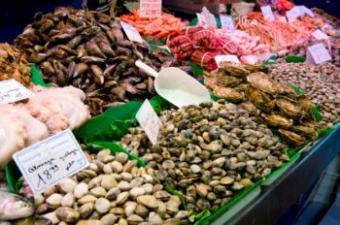
Foods high in zinc are the best way for you to get part of your daily requirement of this important mineral.
Why Zinc Is Important
Zinc is considered by many scientists and nutritionists to be one of the most important minerals your body needs. It's a key component for keeping your bodily functions in good working order.
Zinc's Job
Zinc is responsible for stimulating (triggering) the enzymes in your body. In turn, these enzymes go to work building proteins and fortifying your immune system. Another very important duty of those enzymes is to process DNA. As you can see, zinc plays an important role in cellular metabolism, especially in sexual and liver function. In addition, zinc supports two senses you may take for granted, smell and taste. It helps to think of your body as a machine with your brain being the computer or control center. Your cells use zinc as a conduit (neurotransmitter) for communication within your body's various systems.
Zinc Requirements and Absorption
The average RDA for Zinc is 11 mg for adult males and 8 mg for adult females. If a woman is pregnant, the daily requirement jumps to 11mg. A nursing mother will require the most, needing 12 mg of zinc to give the sufficient amount. Understandably, children's requirements are significantly lower. Just as your body's functions and systems are dependent upon each other, so are the minerals and vitamins. It's not surprising then that there are certain vitamins and another mineral that will help increase your zinc absorption.
- Magnesium
- Vitamin B6
- Vitamin C
- Vitamin E
Getting Enough Zinc in Your Diet
Your body can't manufacture or store zinc, so you need a continuous supply of this mineral. Part of your daily zinc requirement can be supplied by food sources, but the harsh reality is that you cannot eat enough foods for your body to absorb the adequate amount of zinc you need. The average American only consumes about 10% - 15% of the RDA (Recommended Daily Allowance) consistently with some conscientious nutrition-minded people gaining an average of 35%. This is why it's so necessary to take a zinc supplement daily.
More Isn't Better
As with most things, over-consumption isn't healthy. You want to be sure you don't take too much zinc. The best way to determine your needs is with a complete blood workup that measures each vitamin and mineral level in your body. The improper intake of zinc can upset the balance of your immune system as well as the balance of what's considered to be good cholesterol (HDL). Even your levels of iron and copper can be affected by too much zinc.
Eat Foods High in Zinc
Using the food pyramid, you should eat from each food group listed in the food pyramid. The good news is you can find foods in each group that are good sources for zinc.
Meats, Poultry and Fish
Since zinc supports the production of protein, it's not surprising that one of the highest food sources for zinc can be found in high protein foods. The zinc in the following protein foods can be absorbed by your body four times better than any other food source.
- Beef
- Chicken
- Clams
- Crab
- Lamb
- Lobster
- Pork
- Salmon
- Turkey
Plant Food Sources for Zinc
Plant foods such as vegetables and nuts have lower concentrates of zinc, but are still an important food source. Not all grains are created equal. You've probably heard that refined grains aren't good for you, but haven't discovered the why behind the warning. One of the biggest health differences between refined grains and whole grains is whole grains' ability to assist in the production of enzymes necessary to destroy phytic acid. This is important because phytic acid can prevent zinc absorption in your body.
- Legumes (Beans)
- Brown Rice
- Nuts
- Peanuts
- Potatoes
- Pumpkin, Sunflower, Squash, and Watermelon Seeds
- Whole Grains (Cereals and Breads)
- Chocolate and Cocoa Powder
Don't Forget Dairy Products
Another source for zinc is dairy products. These contain less amounts of zinc than meat. Many people who don't eat meat rely upon plant foods and dairy for nutrient requirements.
- Cheese
- Milk
- Yogurt
- Nut Flours and Butters
Balanced Diets Are Key
As you see, there are many choices of foods high in zinc that you can eat to get some of your daily zinc requirements.







